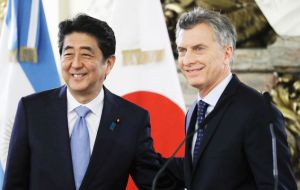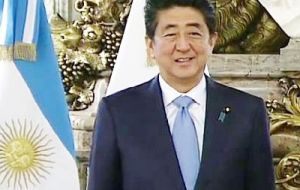MercoPress. South Atlantic News Agency
Argentina and Japan, strategic partners, agree on a investment accord to prop economic ties
 “PM Abe highly commended President Macri for taking active steps for driving the country toward economic and political transformation,” the statement said.
“PM Abe highly commended President Macri for taking active steps for driving the country toward economic and political transformation,” the statement said.  “On the economic level, Japanese companies have a great deal of interest in Argentina, which has enormous potential,” the Japanese prime minister said
“On the economic level, Japanese companies have a great deal of interest in Argentina, which has enormous potential,” the Japanese prime minister said Argentina and Japan agreed on Monday to speed up negotiations for a bilateral investment accord as part of efforts to strengthen economic ties between “strategic partners”. Prime Minister Shinzo Abe and Argentina President Mauricio Macri also agreed to launch talks for a tax pact for increased economic exchanges between the two countries, according to a joint statement issued after their meeting in Buenos Aires.
“The two leaders expressed their expectation toward the promotion of trade and investment between the two countries,” the statement said. “In this regard, they welcomed the initiation of the formal negotiation on the bilateral investment agreement and instructed to make an early conclusion of the negotiation on the agreement.”
The two governments initiated investment talks in September, a Japanese official said, as Tokyo is eager to boost relations with the government of Macri, who has advocated open and pro-business policies since taking office in December.
As of 2015, the number of Japanese companies entering Argentina totaled 51, according to Japanese data. The Latin American country is a major supplier of energy, minerals, soybeans, corn and other commodities for Japan.
“Prime Minister Abe highly commended President Macri for taking active steps for driving the country toward economic and political transformation,” the statement said.
Abe and Macri agreed to deepen exchanges at the leaders' and ministerial levels and affirmed close cooperation in international fora as “strategic partners.”
They underscored their commitment to the success of a summit of the Group of 20 developed and emerging economies Argentina will host in 2018.
The leaders emphasized the importance of maintaining the freedom of navigation and overflight, as well as peaceful settlement of disputes in line with international law, as China has stepped up its territorial claims in the South and East China seas.
They agreed to cooperate in adopting a new U.N. Security Council resolution to impose tougher sanctions on North Korea in response to its fifth and largest nuclear test in September.
Before the joint press conference of Abe with Macri, the two countries signed a memorandum of cooperation for the establishment of a more solid mechanism for consultations on policy, plus another between the Japan External Trade Organization (JETRO) and its counterpart, the International Investment and Trade Agency of Argentina.
Yet another cooperation accord was reached between the same Argentine agency and the Japan Overseas Infrastructure Investment Corporation for Transport & Urban Development (JOIN).
According to data provided by the Foreign Ministry, last year Argentina exported a total of US$1.22 million worth of goods to Japan, while importing goods from the Asian nation valued at US$572 million, a trade volume the Macri Cabinet expects to increase following the bilateral contacts of this visit.
“On the economic level, Japanese companies have a great deal of interest in Argentina, which has enormous potential,” the Japanese prime minister said next to Macri at the Casa Rosada presidential palace in Buenos Aires.
For his part, Macri thanked the prime minister for his visit and said that at this time, with “the world changing so much and with so many challenges ahead,” the “strategic alliance” with Japan could be “very productive” for both societies, since the real solution “is not closing the country off but integrating it” into the world.
Abe arrived in Buenos Aires accompanied by a distinguished group of Japanese business leaders headed by Elichi Hasegawa, special adviser to the prime minister, and made up of top executives from Mitsubishi, Marubeni Corporation, Mitsui, Bank of Tokyo, NEC, Nippon Signal, Toyota Argentina, Honda Motor Argentina and more.
“Free and open economic policies are firmly promoted by President Macri and have the support of the Japanese government. After the first meeting with Macri last April, a plan was created for holding discussions between the two countries with the full participation of the business sector,” Abe said.
“We also took the decision to carry out a project of Kaizen - continuous improvement - for small and medium-sized companies, and it is to be hoped that the introduction of this Japanese business-management system will contribute to the improvement of productivity and stronger competition,” he said.




Top Comments
Disclaimer & comment rules-

-

Read all commentsAll of the sudden so many foreigners visiting Argentina. My skin crawls a little but let's see what happens. Macri has three years to go and just like I said of Cristina Fernandez he will complete his term in office.
Nov 23rd, 2016 - 11:11 pm 0I am Argentine first, hate-everyone else later, and everything else last.
“My skin crawls a little...”
Nov 25th, 2016 - 02:28 pm 0I'm sure if you saw a doctor you could get treatment for your weird phobia. Think how your life would be improved!
Commenting for this story is now closed.
If you have a Facebook account, become a fan and comment on our Facebook Page!